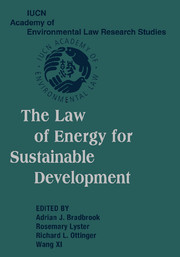Book contents
- Frontmatter
- Contents
- Acknowledgments
- Message from Kofi A. Annan, Secretary-General, United Nations
- Introduction – A Global Learned Society to Address Earth's Evolution: The IUCN Academy of Environmental Law
- Public Lectures on International Environmental Law
- PART ONE SUSTAINABLE DEVELOPMENT AND THE ROLE OF ENERGY LAW
- PART TWO LEGAL ISSUES IN CONTEMPORARY ENERGY LAW
- PART THREE INTERNATIONAL ENERGY LAW
- PART FOUR COMPARATIVE ENERGY LAW
- PART FIVE ELECTRICITY RESTRUCTURING
- PART SIX FINANCING FOR SUSTAINABLE ENERGY
- PART SEVEN CIVIL SOCIETY AND THE PROCEDURAL REQUIREMENTS OF ENERGY LAW FOR SUSTAINABLE DEVELOPMENT
- 30 The Role of Civil Society
- 31 Foundations in University Education
- 32 The Role of the Judiciary
- 33 Access to Justice and Citizen Enforcement
- 34 The Business Case and Approach to Sustainable Energy
- Index
34 - The Business Case and Approach to Sustainable Energy
Published online by Cambridge University Press: 10 August 2009
- Frontmatter
- Contents
- Acknowledgments
- Message from Kofi A. Annan, Secretary-General, United Nations
- Introduction – A Global Learned Society to Address Earth's Evolution: The IUCN Academy of Environmental Law
- Public Lectures on International Environmental Law
- PART ONE SUSTAINABLE DEVELOPMENT AND THE ROLE OF ENERGY LAW
- PART TWO LEGAL ISSUES IN CONTEMPORARY ENERGY LAW
- PART THREE INTERNATIONAL ENERGY LAW
- PART FOUR COMPARATIVE ENERGY LAW
- PART FIVE ELECTRICITY RESTRUCTURING
- PART SIX FINANCING FOR SUSTAINABLE ENERGY
- PART SEVEN CIVIL SOCIETY AND THE PROCEDURAL REQUIREMENTS OF ENERGY LAW FOR SUSTAINABLE DEVELOPMENT
- 30 The Role of Civil Society
- 31 Foundations in University Education
- 32 The Role of the Judiciary
- 33 Access to Justice and Citizen Enforcement
- 34 The Business Case and Approach to Sustainable Energy
- Index
Summary
INTRODUCTION
Economic growth must be socially and environmentally sustainable, fueled by sustainable energy resources. This is a challenge for all parts of society that consume energy, but energy companies have a fundamental role as problem solvers and innovators in the supply of energy. Shell companies are committed to contributing to sustainable energy, and are integrating it into the way they do their work. They are committed to transparency and engaging with people's concerns and expectations.
THE CHALLENGE OF SUSTAINABILITY
Energy demand has grown by eighty percent since 1970, with developing countries taking an increasing share. With the bulk of the world's people still in the full flight of development, energy consumption could grow even faster. By 2030 the world could be consuming twice as much as now – sixty percent of it in today's developing countries. Furthermore, we have an urgent need to address the needs of the almost two billion people, one-third of the world's population, who have no access at present to modern sources of energy. So we need more energy for development. What does this mean for the world in which we live and for the choices which we will have to make? How do we deliver the energy for sustainable development?
Talking to energy company customers all over the world we find that people have very much the same wants and worries.
- Type
- Chapter
- Information
- The Law of Energy for Sustainable Development , pp. 577 - 592Publisher: Cambridge University PressPrint publication year: 2005



